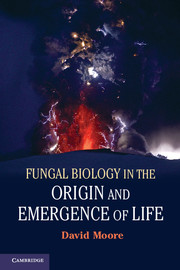Book contents
- Frontmatter
- Contents
- 1 Learning from life on Earth in the present day
- 2 Essentials of fungal cell biology
- 3 First, make a habitat
- 4 The building blocks of life
- 5 An extraterrestrial origin of life?
- 6 Endogenous synthesis of prebiotic organic compounds on the young Earth
- 7 Cooking the recipe for life
- 8 ‘It’s life, Jim . . .’
- 9 Coming alive: what happened and where?
- 10 My name is LUCA
- 11 Towards eukaryotes
- 12 Rise of the fungi
- 13 Emergence of diversity
- References
- Index
1 - Learning from life on Earth in the present day
Published online by Cambridge University Press: 05 February 2013
- Frontmatter
- Contents
- 1 Learning from life on Earth in the present day
- 2 Essentials of fungal cell biology
- 3 First, make a habitat
- 4 The building blocks of life
- 5 An extraterrestrial origin of life?
- 6 Endogenous synthesis of prebiotic organic compounds on the young Earth
- 7 Cooking the recipe for life
- 8 ‘It’s life, Jim . . .’
- 9 Coming alive: what happened and where?
- 10 My name is LUCA
- 11 Towards eukaryotes
- 12 Rise of the fungi
- 13 Emergence of diversity
- References
- Index
Summary
The only known habitat for life is the planet we call Earth. The only place we know the life experiment has been carried out is this planet Earth. We do not know how life originated here, however. Nevertheless, we understand a great deal about the physical and chemical conditions, the environments, and some of the spontaneous (‘self-organising’) mechanisms that the physics and chemistry of this Universe make possible, so there is no difficulty in formulating reasonable models for the emergence and onward evolution of living things. One of the best existing books about this topic starts like this:
The main assumption held by most scientists about the origin of life on Earth is that life originated from inanimate matter through a spontaneous and gradual increase of molecular complexity. This view was given a well-known formulation by Alexander Oparin [Oparin, 1957a], a brilliant Russian chemist who was influenced both by Darwinian theories and by dialectical materialism. A similar view coming from a quite different context was put forward by J. B. Haldane [Haldane, 1929]. By definition, this transition to life via prebiotic molecular evolution excludes panspermia (the idea that life on Earth comes from space) and divine intervention.
(Luisi, 2006, chapter 1, p. 1)Although I intend to discuss here the notion of panspermia (see Chapter 5, below), I will not discuss the other mechanism that Pier Luigi Luisi says is excluded by prebiotic molecular evolution in the quotation above, namely divine intervention. I choose not to include this because personally I see no need to invoke divinely magical or mythological processes in the scientific story I wish to tell: basic physics and chemistry are enough. If you want to round out your reading on the topic then I suggest you start with chapter 1 in Luisi (2006) and chapter 6 of Lurquin (2003). For the real hard-core discussion you don’t need to go much further than Dawkins (1986, 2006) and Scott (2009). If you put the words ‘dawkins’ and ‘god’ together in Amazon’s search window, the software will display publications on both sides of the argument, and from the number of items offered you may get an inkling of why I decided not to venture into this part of the arena!
- Type
- Chapter
- Information
- Fungal Biology in the Origin and Emergence of Life , pp. 1 - 18Publisher: Cambridge University PressPrint publication year: 2013



